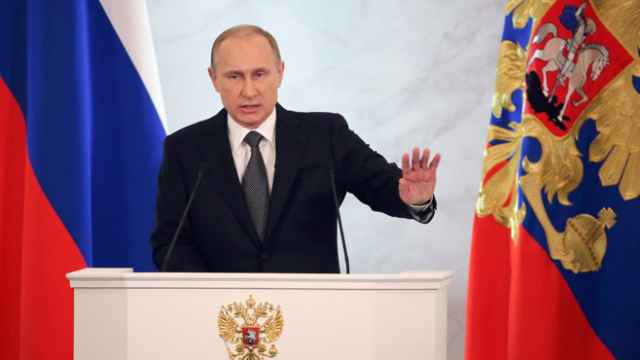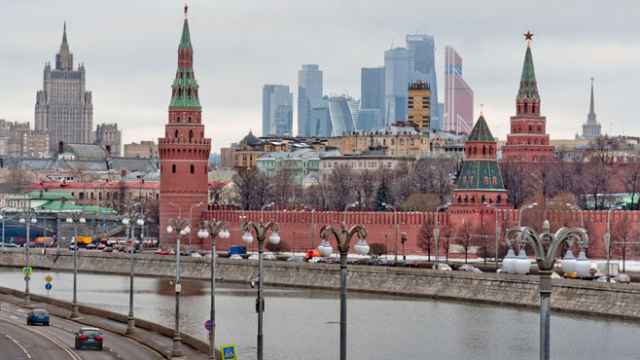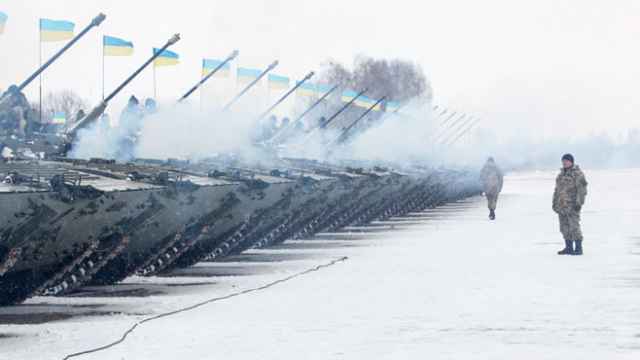Russia will soon celebrate a major milestone — the 70th anniversary of the Soviet victory over German fascism. There will be a parade, numerous speeches and hearty congratulations for the few remaining veterans. In short, the proceedings will follow a tradition that Moscow has long observed during these beautiful spring days. However, I think the time has come to gradually phase out that tradition.
Seventy years is a very long time, if not by historical measure, then at least by human standards. After all, 70 years is the average Russian lifespan, meaning that soon not even people who were children during that time of hardship, much less veterans of the Great Patriotic War, will remain. Whether Russians like it or not, that dramatic page of history has turned.
Interestingly, the Soviet authorities only began celebrating Victory Day in the mid-1960s. They had several reasons for doing so — to show respect for the war's veterans, many of whom were reaching retirement age, to remind specific countries and the world at large of the growing power of the Soviet state as it became a leader in the arms race and space race with the West, and to hold up Soviet society as an example to the world.
Today, half a century later, the original reasons for the holiday are no longer relevant: all but a few of the veterans are gone and the small number that do remain receive only perfunctory attention from the country on May 9, Russia long ago lost its global standing as a military giant and the Soviet Union collapsed. Not only the soldiers themselves, but almost the entire wartime Soviet population has passed from the scene.
Now Russia fights not against real fascists in Germany, but against imaginary ones in Ukraine. Given this, it might make sense to radically shift the focus of the holiday.
The Great Patriotic War was a huge and unforgettable tragedy for the Soviet people. No other country paid such a high price in human life for that war. Estimates of Soviet losses range from the conservative figure of 20 million all the way up to 38 million. But even that does not begin to approximate the deaths indirectly resulting from the conflict, the countless Soviet citizens killed as "enemies" of the state or the entire populations forcibly relocated to other regions of the country.
And now, when the Germany of World War II no longer even exists in its former configuration, when the soldiers of that day and all their contemporaries have largely passed on and the tactical and strategic lessons of that war have long ago lost relevance, the most appropriate way to characterize that conflict is as an enormous human tragedy.
I emphasize the human side of the tragedy. I am no advocate of "rewriting history" and consider it immoral to belittle the contribution that the Soviet people made toward the victory, but I see nothing improper in drawing a clear distinction between the sacrifices made by patriotic citizens and the "contribution" made by leaders who were both inept and indifferent to the suffering of their countrymen.
The errors that Soviet military commanders made, their uninspired bungling of military operations and their egregious contempt toward the lives of their own soldiers — as epitomized by their "Race to Berlin" by May 1, no matter the casualties involved — all of this means that Victory Day is best celebrated not by glorifying the state, but by paying tribute to the soldiers and those who labored on the home front, and by grieving for the innocent civilians and patriots who suffered.
Nobody who grew up or lived even briefly in the Soviet Union will ever forget May 9, no matter which former Soviet territory they now live in or which path those respective countries have taken. Now that Russia has essentially co-opted the holiday, it not so much unifies the peoples of that former superpower as it serves as a bone of contention between the leaders of those various states — none of whom, by the way, had even the slightest personal involvement in that war.
And if Russian leaders really wanted to achieve reconciliation between peoples, witness outpourings of genuine patriotism and foster renewed interest in that war and its participants, it would take steps to "personalize" the holiday.
Instead of parading military equipment through Red Square before bleachers filled with officials and heads of state from a motley collection of minor countries, Kremlin leaders should, first, quickly create a serious state agency — transparent, and accountable to the public — along the lines of the U.S. Department of Veterans Affairs. That agency had a budget of $152.7 billion in 2014, and its director is part of the U.S. government.
Second, they should begin working not so much on perpetuating a nostalgic but vague memory of that conflict, as on the detailed retelling of the actual events of the war. That could serve as a source of reflection and pride for current and future generations of people that live in countries that took part in that war and that experienced its hardships and deprivations.
Such a retelling of history is a complex and potentially contentious process, but it is the best way to understand what happened to all those people so many years ago. Russia should not glorify that war as its own history, exclusive of others, but collaborate with the governments and civil society organizations of all the former Soviet entities to create an Institute of Soviet Civilization devoted to the historical study of that long period of mutual co-existence and supported by historical artifacts and documents from that increasingly remote era.
The main principle guiding the work of that institution would be the universal participation by specialists and representatives from each of the former Soviet republics or states. Only in that way could it reflect the multifaceted nature of that bygone superpower, underscore the uniqueness of its heroic and tragic history and clarify not only the past, but also what lessons we can learn from our fathers and grandfathers, as well as what mistakes we should take pains to avoid.
As long as Russia maintains an exclusive claim over Soviet history, that legacy cannot serve as a source of true patriotism. For it to do so, it must become a history of peoples, and not governments.
If Russia had earlier made attempts to adopt this attitude, if it had gradually shifted its focus to the tragic nature of the war and "reformatted" its collective memory accordingly, if it had given less emphasis to specifically Russian aspects of that conflict and more to the post-Soviet context as a whole, it would not be facing the current wave of "de-communization" that is sweeping former Soviet republics and states.
War is always a tragedy, and history, by definition, is past. If we remember that lesson during this anniversary of that glorious victory, it can improve life for the children and grandchildren of those soldiers who died decades ago so that their progeny might have a better future. We should remember them, but not make their feats into bargaining chips to achieve short-term political ambitions.
Vladislav Inozemtsev is director of the Moscow-based Center for Post-Industrial Studies and is currently the Berthold Beitz Fellow with the German Council on Foreign Relations (DGAP)
A Message from The Moscow Times:
Dear readers,
We are facing unprecedented challenges. Russia's Prosecutor General's Office has designated The Moscow Times as an "undesirable" organization, criminalizing our work and putting our staff at risk of prosecution. This follows our earlier unjust labeling as a "foreign agent."
These actions are direct attempts to silence independent journalism in Russia. The authorities claim our work "discredits the decisions of the Russian leadership." We see things differently: we strive to provide accurate, unbiased reporting on Russia.
We, the journalists of The Moscow Times, refuse to be silenced. But to continue our work, we need your help.
Your support, no matter how small, makes a world of difference. If you can, please support us monthly starting from just $2. It's quick to set up, and every contribution makes a significant impact.
By supporting The Moscow Times, you're defending open, independent journalism in the face of repression. Thank you for standing with us.
Remind me later.








